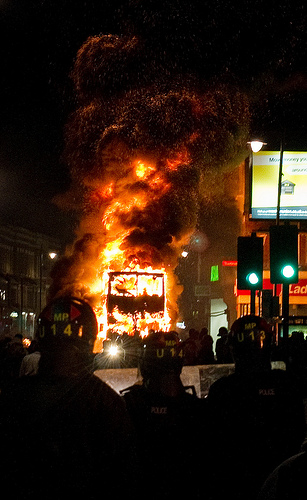In 2008 a financial crisis, caused to a great extent by bankers’ greed, led to a bailout and billions were transferred from the taxpayer to the guilty bankers, with few strings attached. In 2009 a scandal erupted in the UK over politicians’ expenses, with dozens of MPs from all parties guilty of fiddling thousands more from the lumpen taxpayer. And in 2010, when the shameless bankers started threatening now highly-indebted governments, it came to light that large corporations were avoiding billions in taxes, the payment of which would have alleviated the need for austerity measures. Yet David Cameron’s Conservative-led government did nothing to claw back this money, instead concentrating on taking from society’s weakest: the disabled, the sick, the young, the old, the foreign and the unemployed.
With legitimate means of earning a living on the wane (there’s one vacancy for every fifty applicants in some areas) and immoral ways de rigueur, thanks to the example of the elite, why is it a surprise that young people should turn to crime to get the things they feel they need? Of course, many of those looting trainers, televisions and telephones already had all these things, but constant advertising has told them that without the latest and the best equipment they will never be fulfilled.
The looting only required a trigger, and it came with the apparent killing by police of a young black man, Mark Duggan, and the subsequent response by the IPCC (the Independent Police Complaints Commission, charged with investigating the death) to protests by Duggan’s family. News of the riots spread quickly through new technology, and so did images of people in Tottenham looting without fear.
Other people in other areas decided they fancied a bit of the action and some of the booty. These later riots had little to do with Mark Duggan or the IPCC and everything to do with copycat greed: young people copying the example of the bankers, the politicians and the owners of multinational corporations.
Is this too simplistic an explanation? Probably. In an excellent piece in the Guardian newspaper, north Londoner Aditya Chakrabortty describes the different causes inferred from the recent riots and looting in English cities and shows how differently locals, academics and politicians perceive the problem. According to Chakrabortty…
“If you’re a leftwinger, the causes of the violence and looting are straightforward: they’re the result of monstrous inequality and historic spending cuts; while the youth running amok through branches of JD Sports are what happens when you offer a generation plastic consumerism rather than meaningful jobs.”
He goes on to mention the right-wing characterisation of a sickness in parts of society. This is more descriptive than analytical – the cause of the sickness is what matters, for armed with that we may be able to discern a cure. He brings in the economists, who show that a quick drop in living standards leads to an even quicker rise in instability, and vice versa. I’m sure this is true. And he quotes a local who points out that looting a newsagent or torching a BMW is criminal rather than revolutionary. Right again.
It seems to me that the causes of the rioting are complex but they must be seen in a wider context. Capitalism and consumerism have led to greed and pressure on parents to provide material goods rather than happy homes. As capitalism collapses every part of society is put under extra stress. Individuals need to change their mindsets if they are to adapt to changing times, a process made all the more difficult when they see the rich and powerful raking in obscene profits and bonuses.
The short term solution is for the world’s governments to meet and agree to close tax havens and set similar tax rates for corporations and the super-rich in every nation: with nowhere to run, these tax avoiders would be forced to ‘stand and deliver’ what is rightfully ours. Governments could then halt the painful and unfair austerity measures and instead invest in green jobs. They should also drastically limit advertising, for over-consumption is a problem and not a solution. These measures would go some way toward solving the financial crisis, the sovereign debt crisis and the instability blighting our world all in one, but real revolutionary change may be needed if the human race is to see this century out.
William Coffin
Zarg writes: With so few resources left to play with, the mindless destruction of human property by other humans is counter-productive in the extreme. It only hastens the demise of your species and my return to Planet X as a wiser but sadder alien. Quite sensibly, looting and rioting are frowned upon, but there are plenty of other vastly destructive practices that go on unmolested: boxing and motor racing; competition between manufacturers of sweet chemical drinks; industrial warfare and the production of destruction. While these continue, the writing is on the wall for you Earthlings. What surprises me is how many people seem to know this, yet carry on with their daily lives as if nothing at all were happening.

